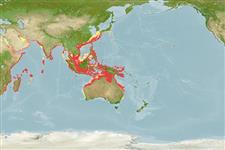>
Siluriformes (Catfishes) >
Ariidae (Sea catfishes) > Ariinae
Etymology: Netuma: A Tamil word that means "dance".
More on author: Rüppell.
Environment: milieu / climate zone / depth range / distribution range
Écologie
marin; eau douce; saumâtre démersal; amphidrome (Ref. 51243); profondeur 10 - 195 m (Ref. 12260). Subtropical; 34°N - 34°S, 32°E - 154°E
Indo-West Pacific: known with certainty from the Red Sea and the northwestern Indian Ocean. Also reported from Australia, Polynesia and Japan and rarely in the Mekong delta (Ref. 12693).
Length at first maturity / Taille / Poids / Âge
Maturity: Lm 36.3, range 33 - 45 cm
Max length : 185 cm TL mâle / non sexé; (Ref. 30573); common length : 70.0 cm TL mâle / non sexé; (Ref. 9987); poids max. publié: 1.0 kg (Ref. 4883)
A marine species often found in estuaries, but rarely enters freshwater. Typically euryhaline (Ref. 3876). Reported to occasionally ascend into fresh water (Ref. 12693). Recorded at temperatures ranging from 26-29°C. Feeds mainly on crabs, prawns, mantis shrimps (Squilla species) but also on fishes and mollusks. An important food fish. Marketed mostly fresh; often dried.
Incubates eggs in the mouth. The fry continue to take refuge in the mouths of the male fish for the first 2 months and once they leave, the males start to eat avidly and may consume their ouwn young.
Rainboth, W.J., 1996. Fishes of the Cambodian Mekong. FAO species identification field guide for fishery purposes. FAO, Rome, 265 p. (Ref. 12693)
Statut dans la liste rouge de l'IUCN (Ref. 130435)
Menace pour l'homme
Traumatogenic (Ref. 58010)
Utilisations par l'homme
Pêcheries: commercial; pêche sportive: oui
Outils
Articles particuliers
Télécharger en XML
Sources Internet
Estimates based on models
Preferred temperature (Ref.
123201): 22.1 - 28.3, mean 26.8 °C (based on 839 cells).
Phylogenetic diversity index (Ref.
82804): PD
50 = 0.6250 [Uniqueness, from 0.5 = low to 2.0 = high].
Bayesian length-weight: a=0.00871 (0.00728 - 0.01042), b=3.06 (3.01 - 3.11), in cm total length, based on LWR estimates for this species (Ref.
93245).
Niveau trophique (Ref.
69278): 3.5 ±0.2 se; based on diet studies.
Generation time: 17.2 ( na - na) years. Estimated as median ln(3)/K based on 2
growth studies.
Résilience (Ref.
120179): Faible, temps minimum de doublement de population : 4,5 à 14 années (K=0.06-0.45; tm=2-4; tmax=19; Fec=34-88).
Prior r = 0.31, 95% CL = 0.17 - 0.58, Based on 4 stock assessments.
Fishing Vulnerability (Ref.
59153): Moderate to high vulnerability (48 of 100).
Climate Vulnerability (Ref.
125649): High vulnerability (57 of 100).
Nutrients (Ref.
124155): Calcium = 26.3 [14.3, 64.9] mg/100g; Iron = 0.78 [0.47, 1.40] mg/100g; Protein = 18.1 [16.3, 19.9] %; Omega3 = 0.348 [0.179, 0.692] g/100g; Selenium = 46.2 [23.4, 97.4] μg/100g; VitaminA = 6.46 [2.31, 18.39] μg/100g; Zinc = 0.682 [0.451, 1.055] mg/100g (wet weight);
